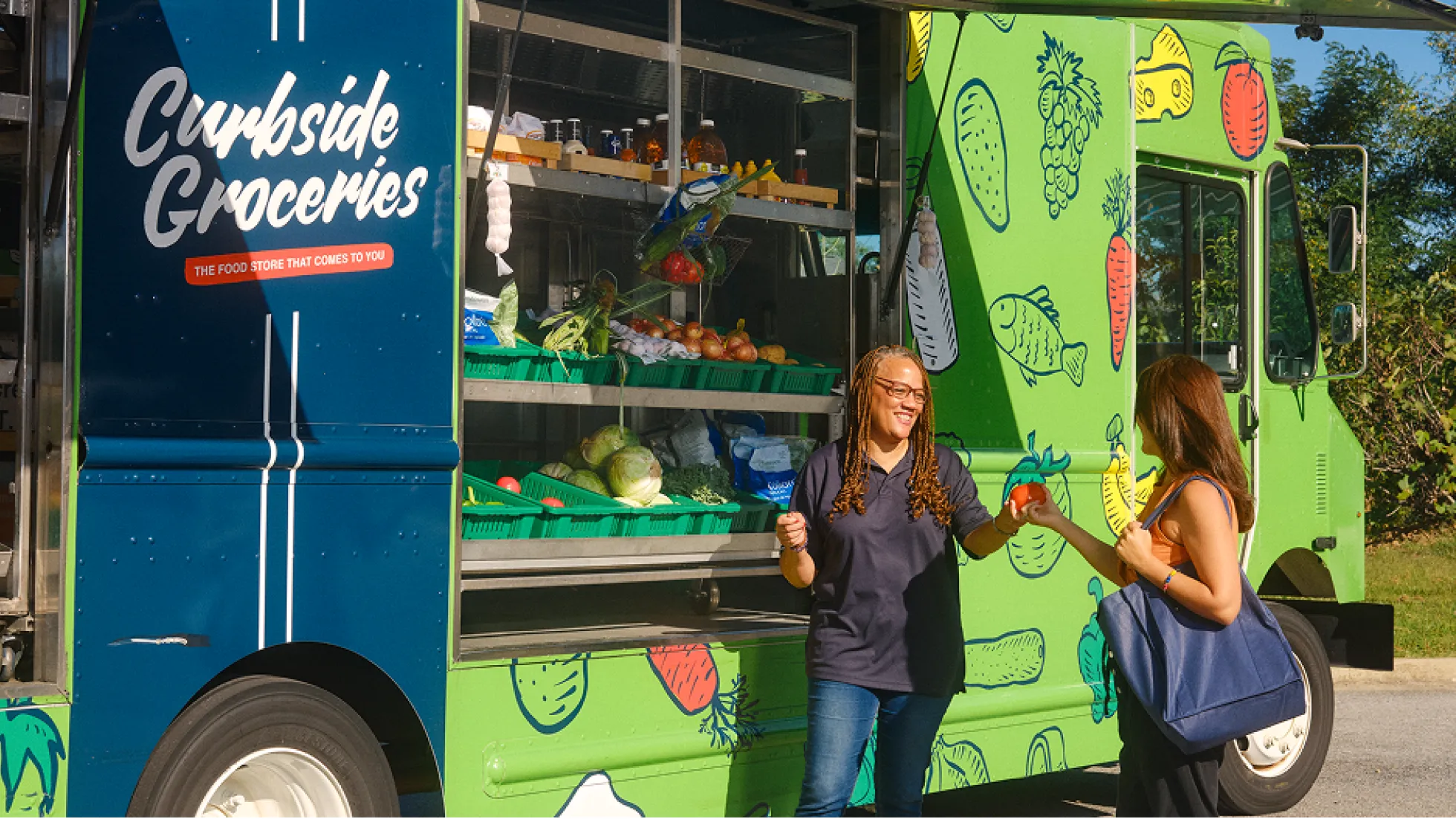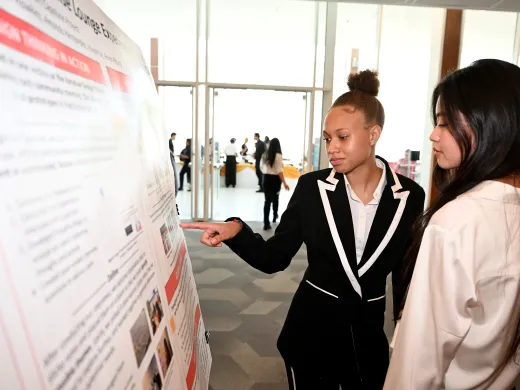Grantee Case Study
Creating Innovative and Long-Term Solutions to Hunger
with Capital Area Food Bank
The Capital Area Food Bank (CAFB) powers the entire Washington, DC region’s food access efforts, partnering with more than 400 partner organizations in DC, Maryland, and Virginia to serve more than 60 million meals each year. In 2019, CAFB embarked on a strategic planning process, leveraging its expertise, capacity and role as a regional collaborator. With a commitment to strengthening the infrastructure of key community anchor organizations in the DC region, the Clark Foundation invested in CAFB’s new strategic direction. The process focused on both short and long-term solutions to alleviate poverty, supporting clients with myriad resources to help them build healthier and more secure lives.

Creating Innovative and Long-Term Solutions to Hunger | Clark Foundation
Implementing a New Strategic Vision
For 45 years, the Capital Area Food Bank has been a connector of people and organizations, a voice for underrepresented residents, and has developed neighborhood-level relationships across the region. In 2019, CAFB sought to build upon its history and expand its mission to use food as an entry point into supporting the comprehensive needs of individuals. When CAFB met with the Clark Foundation, it asked for support to implement this vision through a new five-year strategic plan.
“They listened first. They listened intently. They understood,” Muthiah said of the Foundation. “Then they bought into our strategic plan and vision for our community, and how we were extending our mission from the core part, providing food to those who need it, to bundling food with other services and helping people thrive.”
Interviews and surveys with more than 2,000 CAFB clients revealed that access to transportation, education and job skills, and financial literacy were among the top factors preventing individuals from reaching economic stability. By coupling food with other basic services like education, skill building and health care, CAFB’s "Food+ (Plus)" programs provide a holistic set of interventions that help clients to lead healthier lives and attain financial sustainability. “In a one-stop-shop type of way, people can get multiple services that they need to be able to thrive,” said Muthiah. The basic necessity of food enables the food bank to act as a conduit to medical care, higher education and skills development, and other services that can have a long-term impact on health and financial security.
The organization’s focus on using food as a key to overall well-being appealed to the Clark Foundation, which during its spend-down sought partners that were developing innovative solutions to challenges in their fields. “It's hard for organizations to get seed capital in order to take chances and risks on these new initiatives that are a little bit outside of what their core focus is. We didn't think like that. We wanted to provide that seed capital, that risk capital, to help these organizations build some of these partnerships and look at some of these opportunities that can grow into something that's much bigger and more powerful,” said Joe Del Guercio, Clark Foundation President and CEO.
Muthiah noted that the Foundation provided significant financial support while trusting CAFB to deploy multi-year funding that invested in the nuts and bolts that the organization needed to create the impact it envisioned. “It was one of our first multi-year, multimillion dollar investments, and psychologically, it gave us all an incredible boost of confidence to have a three-year runway to be able to invest in ourselves, invest in the community, and to test things. The Clark Foundation team gave us the freedom to take risks and to learn from those risks.”
Making Data-Informed Decisions
The Foundation’s investment supported five of CAFB’s key goals: Cultivating data about local needs, using technology to understand and meet the unique needs of micro-communities; positioning CAFB as a credible and viable entity to address hunger today and in the future; enhancing residents’ access to good, nutritious food by making it easier to obtain; bolstering the food bank’s fundraising capacity as the anchor of the hunger relief infrastructure in the region; and continuing to increase the efficiency and effectiveness of its operations.
With the Clark Foundation’s seed-funding, CAFB significantly increased staff training and use of technology to more efficiently and effectively collect client data, which is then used as a tool to shape their programming and inform a regional network of service providers. In 2020, CAFB produced the region’s first-ever Hunger Report, the only comprehensive exploration of food insecurity in the region, including key drivers of hunger and other indicators of economic inequity. This now-annual publication has become invaluable to local governments, industry, nonprofits and philanthropies seeking to make healthy food more accessible in the DC region.
CAFB also significantly enhanced its “Hunger Heat Map” for tracking and visualizing food insecurity and opportunities for additional services down to a census-tract level. This data enables CAFB to work more effectively with its local partners that are assisting neighborhood residents through data-driven solutions that enable the distribution of over 60 million meals annually.
A Visionary Leader Helps Strengthen Local Partnerships
As with other strategic partners, the Clark Foundation’s investment was in part driven by the strong leadership and vision of Muthiah, who joined the organization in 2018. Under Muthiah, CAFB has focused on strengthening the food bank’s long-standing partnerships, while also creating new ones. “Radha is incredibly strategic. We wanted to invest in leaders who are thinking about long-term sustainability, long-term action, and not just simply trying to put band-aids on problems,” Del Guercio said. “Radha is constantly thinking about ways to increase capacity, work with organizations and communities they support, and look at partnerships and other solutions that hopefully benefit the communities in more ways than just food.”
One of these partnerships is a “food pharmacy” at three medical institutions in the area – Children’s National Hospital, Unity Health Care and University of Maryland Medical System –where patients and their families can avail themselves of free, medically tailored food to take home. The food pharmacies at these three institutions have served nearly 2,500 unique families since 2021. Families receiving services through the Children’s National Diabetes Care Clinic increasingly choose to schedule their appointments at the main hospital rather than the satellite locations so they can access the pharmacy’s groceries. It’s an example of meeting people where they are and, to the Clark Foundation, a key to bolstering its focus on parent-child health throughout the region. “Food is an immediate need, but it’s just one piece of the puzzle of what needs to happen to help communities,” Del Guercio said.
Making the food pharmacy concept a reality was complicated, involving lengthy discussions with the hospitals and health insurance companies. Muthiah noted that the Clark Foundation was an invaluable partner in helping CAFB think through the project and navigate getting it off the ground. “A food bank alone can’t facilitate this. An insurance company or Medicaid can’t facilitate this. Clark invested in these things because they understand what it means to have strong institutions that can engage with one another, and they understand that in the end, it’s the patients and clients who are benefiting.”
Muthiah has also made it a priority to seek out professionals and local influencers to join the food bank’s Board of Directors, including representatives from major Mid-Atlantic food retailers that have long supported CAFB’s mission; corporations in the largest and fastest growing industries in the region; subject-matter experts to align with CAFB’s Food+ programs, including in workforce development, health and education; and community leaders in the DC region.
Expanding Programs and Partnerships in the DC Region
Having increased its analytic capabilities and staff capacity while launching a range of other services aimed at helping people become food secure, CAFB is now focused on thoughtfully expanding its programs and addressing the root causes of hunger. Part of this effort includes determining the most effective revenue streams and structuring partnerships that, Muthiah notes, will enable CAFB to meet its goal of ensuring a “steady pipeline of support for our community members.”
To sustain this expansion, CAFB was able to leverage the Clark Foundation’s investment to attract additional partners from both the public and private sectors. “When you're doing something new, there’s nothing like having an established partner investor that has put its resources behind it as a sign that they’ve evaluated it and thinks it’s worthwhile. It’s the springboard that has allowed us to translate our ideas into programs,” Muthiah said, adding that the Foundation had introduced her organization to potential funders. “Clark had the vision to understand what this could mean for our community and provided that initial core investment for us to take some giant leaps and bounds.”
Del Guercio believed that CAFB will continue to be perceived as not only an anchor of services in the DC region but a leading driver of change in how services are provided to residents. “My hope is that some of these early initiatives and seed capital investments will become bigger programs that are funded by others in the future. I see it becoming a stronger and evolving organization. They’ve been moving in that direction on their own, and our goal was to help propel them forward.”
Additional Case Studies
View All

